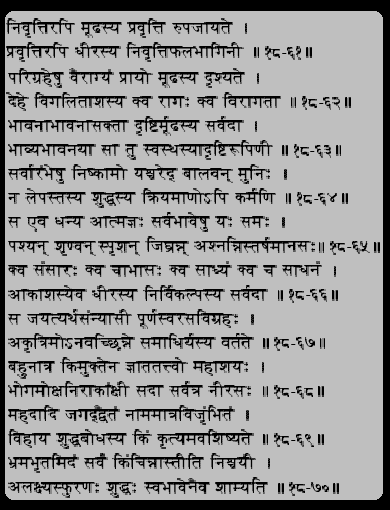



Ashtavakra said:
Even
abstention from action has the effect of action in a fool, while
even the action of the wise man brings the fruits of inaction. 18.61
A fool often
shows aversion towards his belongings, but for him
whose attachment to the body has dropped away,
there is neither attachment nor aversion. 18.62
The mind of
the fool is always caught in thinking or not thinking,
but the wise man's is of the nature of no thought because
he thinks what is appropriate. 18.63
For the seer
who behaves like a child, without desire in all actions,
there is no attachment for such a pure one even
in the work he does. 18.64
Blessed is
he who knows himself and is the same in all states,
with a mind free from craving whether he is seeing, hearing,
feeling, smelling, or tasting. 18.65
There is no
one subject to samsara, no sense of individuality, no goal
or means to the goal in the eyes of the wise man who is always
free from imagination and unchanging like space. 18.66
Glorious is
he who has abandoned all goals and is the incarnation
of the satisfaction, which is his very nature, and whose inner
focus on the Unconditioned is quite spontaneous. 18.67
In brief,
the great-souled man who has come to know the Truth is
without desire for either pleasure or liberation, and is always
and everywhere free from attachment. 18.68
What remains
to be done by the man who is pure awareness
and has abandoned everything that can be expressed in words
from the highest heaven to the earth itself? 18.69
The pure man
who has experienced the Indescribable attains
peace by virtue of his very nature, realising that all this is
nothing but illusion, and that nothing is. 18.70
[Translation by John Richards]